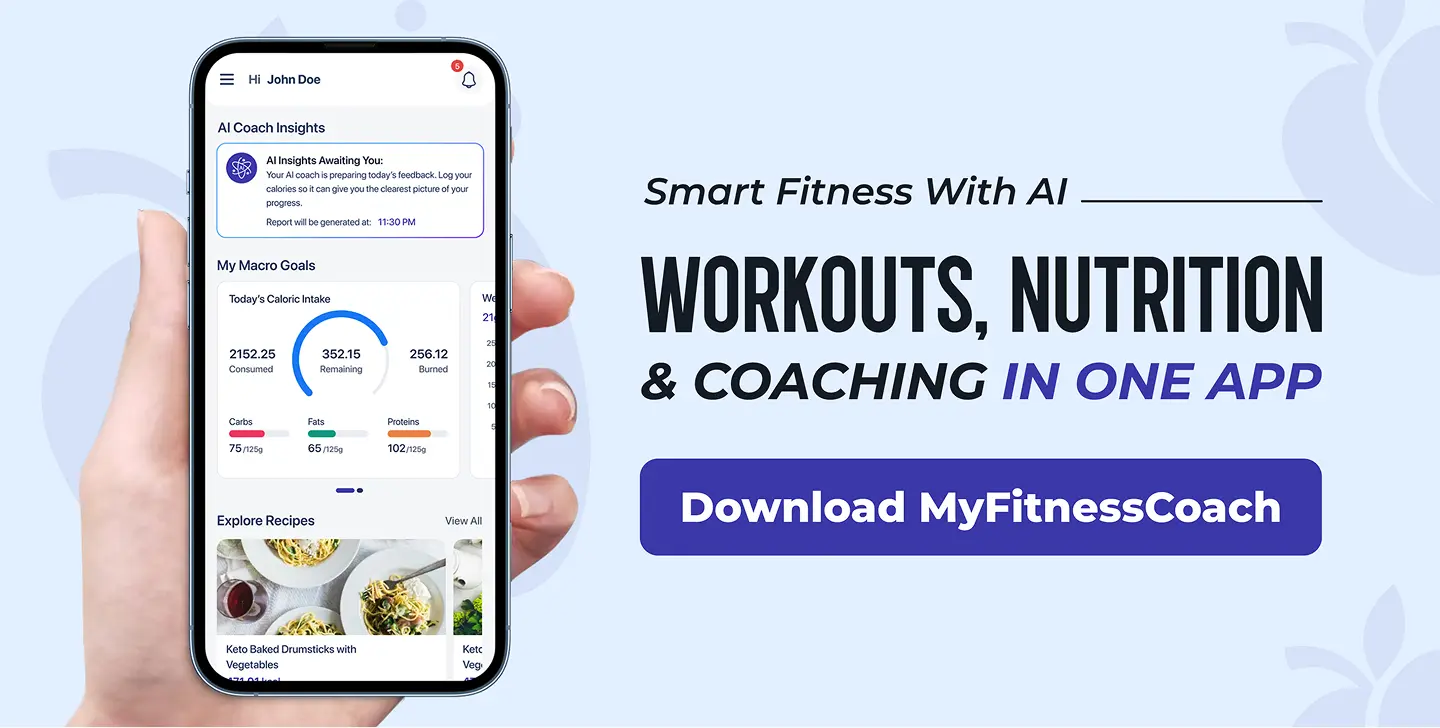How Do I Know If I’m in a Calorie Deficit?

MyFitnessCoach
December 23, 2024
Maintaining a calorie deficit is one of the most important factors for losing weight effectively. But how do you know if you’re actually in a calorie deficit? Let’s break this down in simple, easy-to-understand steps, so you can confidently take control of your health and fitness journey. By the end of this article, you’ll have a clear understanding of what a calorie deficit is, how to measure it, and the signs that show you’re on the right track.
And guess what? Tools like the MyFitnessCoach app make this process even easier for you!
5 Ways to Know If You’re in a Calorie Deficit
Now that you know what a calorie deficit is, let’s go over how you can tell if you’re actually in one.
1. You’re Losing Weight Over Time
One of the clearest signs that you’re in a calorie deficit is consistent weight loss. If you notice your weight going down steadily (around 1-2 pounds per week), you’re likely burning more calories than you’re eating.
Tip: Use a digital scale and weigh yourself at the same time each day (like in the morning). Track your progress weekly using the MyFitnessCoach app.
2. Your Measurements Are Changing
Sometimes the scale doesn’t tell the full story. Even if your weight doesn’t drop quickly, you might still be in a calorie deficit. Check your body measurements:
- Waist circumference
- Hip circumference
- Thighs and arms
If these measurements are shrinking, you’re losing fat.
3. You’re Feeling Slightly Hungrier Than Usual
Hunger is a natural sign of being in a calorie deficit. When you eat fewer calories, your body signals that it needs more energy. However, feeling slightly hungry between meals is completely normal and not something to worry about.
Tip: Drink plenty of water and eat foods high in protein and fiber to stay full longer.
4. Your Energy Levels Might Dip Slightly
When you reduce calories, it’s normal to feel a slight decrease in energy, especially in the first week. This is your body adjusting to the calorie deficit.
Solution: Make sure you’re still getting enough nutrients from your meals. The MyFitnessCoach app can suggest healthy meal ideas that fuel your body while keeping you in a calorie deficit.
5. Your Clothes Fit Better
Another easy way to know if you’re in a calorie deficit is by how your clothes fit. If your jeans or shirts feel looser, this is a great sign that you’re losing fat and making progress.
Tips for Staying in a Calorie Deficit Safely
Here are a few simple tips to help you maintain a calorie deficit without feeling miserable:
- Track Your Meals: Use the MyFitnessCoach app to log your food and stay within your calorie target.
- Focus on Nutrient-Dense Foods: Eat more vegetables, lean proteins, whole grains, and healthy fats.
- Avoid Liquid Calories: Sodas, juices, and sugary coffees can add up quickly.
- Stay Active: Add strength training and cardio exercises to boost calorie burn.
- Stay Hydrated: Drinking water helps reduce hunger and keeps your body functioning well.
Knowing if you’re in a calorie deficit doesn’t have to be complicated. By tracking your progress, eating nutritious meals, and staying consistent, you’ll see results over time. The key is to find a method that works for you and stick with it.
The MyFitnessCoach app is here to simplify your fitness journey. With its easy calorie tracking, personalized meal plans, and exercise suggestions, you’ll have all the tools you need to stay in a calorie deficit and achieve your weight loss goals.

Ready to take control of your health? Download the MyFitnessCoach app today and start seeing real results!
Similar Articles
Stay informed with these similar articles.

MyFitnessCoach
October 18, 2023
What Does Body Goals Mean? A Path to a Healthy Lifestyle
In the world we live in now, lots of people talk about "body goals," which means having a body that's seen as perfect. On social media, in magazines, and on TV, we see lots of pictures of people with what seems like perfect bodies, which makes us feel like we have to look like them. But the real meaning of "body goals" is more than just looking good. It's about taking care of your whole self, not just how you look. In this article, we will discuss what does body goals actually mean and how you can achieve your body goals. Let’s get started:
.webp&w=3840&q=75)
MyFitnessCoach
September 5, 2023
How Much Protein in an Egg | The Nutritional Power
Eggs have long been a breakfast favorite for many, and for good reason. They're not only delicious but also packed with essential nutrients, making them a versatile and nutritious addition to your diet. One of the most common questions about eggs is, "How much protein is in an egg?" In this comprehensive guide, we'll delve into the world of eggs and explore their protein content, nutritional benefits, and how they can contribute to a balanced diet.

MyFitnessCoach
May 18, 2023
Fitness Guide: How Do I Start A Weight Loss Journey
Ready to start on a life-changing weight-loss journey? Congratulations for taking the first step towards being a better and happier version of yourself! Starting off a weight-loss journey may be both satisfying and stressful. With so much information available, having a well-defined plan and trusted assistance in achieving your goals is important. This article will help you start your weight-loss journey and achieve the results you desire.
